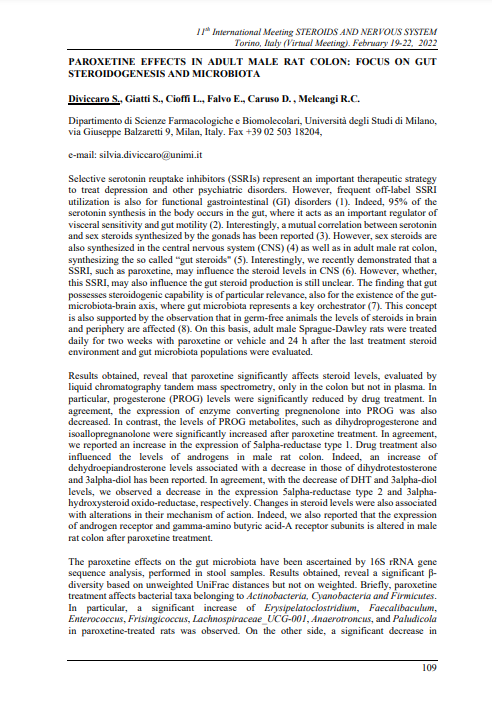Paroxetine effects in adult male rat colon: focus on gut steroidogenesis and microbiota (2022)


11th International Meeting STEROIDS AND NERVOUS SYSTEM
Torino, Italy (Virtual Meeting). February 19-22, 2022
PAROXETINE EFFECTS IN ADULT MALE RAT COLON: FOCUS ON GUT STEROIDOGENESIS AND MICROBIOTA
Diviccaro S., Giatti S., Cioffi L., Falvo E., Caruso D. , Melcangi R.C.
Dipartimento di Scienze Farmacologiche e Biomolecolari, Università degli Studi di Milano, via Giuseppe Balzaretti 9, Milan, Italy. Fax +39 02 503 18204,
e-mail: silvia.diviccaro@unimi.it
Selective serotonin reuptake inhibitors (SSRIs) represent an important therapeutic strategy to treat depression and other psychiatric disorders. However, frequent off-label SSRI utilization is also for functional gastrointestinal (GI) disorders (1). Indeed, 95% of the serotonin synthesis in the body occurs in the gut, where it acts as an important regulator of visceral sensitivity and gut motility (2). Interestingly, a mutual correlation between serotonin and sex steroids synthesized by the gonads has been reported (3). However, sex steroids are also synthesized in the central nervous system (CNS) (4) as well as in adult male rat colon, synthesizing the so called “gut steroids" (5). Interestingly, we recently demonstrated that a SSRI, such as paroxetine, may influence the steroid levels in CNS (6). However, whether, this SSRI, may also influence the gut steroid production is still unclear. The finding that gut possesses steroidogenic capability is of particular relevance, also for the existence of the gut- microbiota-brain axis, where gut microbiota represents a key orchestrator (7). This concept is also supported by the observation that in germ-free animals the levels of steroids in brain and periphery are affected (8). On this basis, adult male Sprague-Dawley rats were treated daily for two weeks with paroxetine or vehicle and 24 h after the last treatment steroid environment and gut microbiota populations were evaluated.
Results obtained, reveal that paroxetine significantly affects steroid levels, evaluated by liquid chromatography tandem mass spectrometry, only in the colon but not in plasma. In particular, progesterone (PROG) levels were significantly reduced by drug treatment. In agreement, the expression of enzyme converting pregnenolone into PROG was also decreased. In contrast, the levels of PROG metabolites, such as dihydroprogesterone and isoallopregnanolone were significantly increased after paroxetine treatment. In agreement, we reported an increase in the expression of 5alpha-reductase type 1. Drug treatment also influenced the levels of androgens in male rat colon. Indeed, an increase of dehydroepiandrosterone levels associated with a decrease in those of dihydrotestosterone and 3alpha-diol has been reported. In agreement, with the decrease of DHT and 3alpha-diol levels, we observed a decrease in the expression 5alpha-reductase type 2 and 3alpha- hydroxysteroid oxido-reductase, respectively. Changes in steroid levels were also associated with alterations in their mechanism of action. Indeed, we also reported that the expression of androgen receptor and gamma-amino butyric acid-A receptor subunits is altered in male rat colon after paroxetine treatment.
The paroxetine effects on the gut microbiota have been ascertained by 16S rRNA gene sequence analysis, performed in stool samples. Results obtained, reveal a significant β- diversity based on unweighted UniFrac distances but not on weighted. Briefly, paroxetine treatment affects bacterial taxa belonging to Actinobacteria, Cyanobacteria and Firmicutes. In particular, a significant increase of Erysipelatoclostridium, Faecalibaculum, Enterococcus, Frisingicoccus, Lachnospiraceae_UCG-001, Anaerotroncus, and Paludicola in paroxetine-treated rats was observed. On the other side, a significant decrease in Clostridia_UCG-014, Clostridium_sensu_stricto_1, Acetatifactor, Papillibacter were detected. Moreover, Gastranaerophilales and Eggerthellaceae_uncultured belonging to Cyanobacteria and Actinobacteria, respectively, significantly decreased in paroxetine- treated rats.
Altogether, these data showing that paroxetine treatment modifies gut steroidogenesis and microbiota composition suggest a role in host homeostasis and possibly in the regulation of gut-brain axis.
References List
[1] Gershon MD, Tack J. The serotonin signaling system: from basic understanding to drug development for functional GI disorders. Gastroenterology. 2007 Jan;132(1):397-414. doi: 10.1053/j.gastro.2006.11.002. PMID: 17241888.
[2] Farmer AD, Randall HA, Aziz Q. It's a gut feeling: how the gut microbiota affects the state of mind. J Physiol. 2014 Jul 15;592(14):2981-8. doi:10.1113/jphysiol.2013.270389. Epub 2014 Mar 24. PMID: 24665099; PMCID: PMC4214654.
[3] So SY, Savidge TC. Gut feelings: the microbiota-gut-brain axis on steroids. Am J Physiol Gastrointest Liver Physiol. 2022 Jan 1;322(1): G1-G20. doi:10.1152/ajpgi.00294.2021. Epub 2021 Nov 3. PMID: 34730020; PMCID: PMC8698538.
[4] Giatti S, Diviccaro S, Serafini MM, Caruso D, Garcia-Segura LM, Viviani B, Melcangi RC. Sex differences in steroid levels and steroidogenesis in the nervous system: Physiopathological role. Front Neuroendocrinol. 2020 Jan; 56:100804. doi: 10.1016/j.yfrne.2019.100804. Epub 2019 Nov 2. PMID:31689419.
[5] Diviccaro S, Giatti S, Borgo F, Falvo E, Caruso D, Garcia-Segura LM, Melcangi RC. Steroidogenic machinery in the adult rat colon. J Steroid Biochem Mol Biol. 2020 Oct; 203:105732. doi: 10.1016/j.jsbmb.2020.105732. Epub 2020 Aug 7. PMID:32777355.
[6] Giatti S, Diviccaro S, Cioffi L, Falvo E, Caruso D, Melcangi RC. Effects of paroxetine treatment and its withdrawal on neurosteroidogenesis. Psychoneuroendocrinology. 2021 Oct; 132:105364. doi: 10.1016/j.psyneuen.2021.105364. Epub 2021 Jul 21. PMID: 34325207.
[7] Cryan JF, O'Riordan KJ, Cowan CSM, Sandhu KV, Bastiaanssen TFS, Boehme M, Codagnone MG, Cussotto S, Fulling C, Golubeva AV, Guzzetta KE, Jaggar M, Long-Smith CM, Lyte JM, Martin JA, Molinero- Perez A, Moloney G, Morelli E, Morillas E, O'Connor R, Cruz-Pereira JS, Peterson VL, Rea K, Ritz NL, Sherwin E, Spichak S, Teichman EM, van de Wouw M, Ventura-Silva AP, Wallace-Fitzsimons SE, Hyland N, Clarke G, Dinan TG. The Microbiota-Gut-Brain Axis. Physiol Rev. 2019 Oct 1;99(4):1877-2013. doi: 10.1152/physrev.00018.2018. PMID: 31460832.
[8] Diviccaro S, Caputi V, Cioffi L, Giatti S, Lyte JM, Caruso D, O'Mahony SM, Melcangi RC. Exploring the Impact of the Microbiome on Neuroactive Steroid Levels in Germ-Free Animals. Int J Mol Sci. 2021 Nov 21;22(22):12551. doi:10.3390/ijms222212551. PMID: 34830433; PMCID: PMC8622241.
https://www.researchgate.net/publication/358700233_11th_International_Meeting_Steroids_and_Nervous_System_-_Torino_2022_Abstract_book (Pag. 109-110)